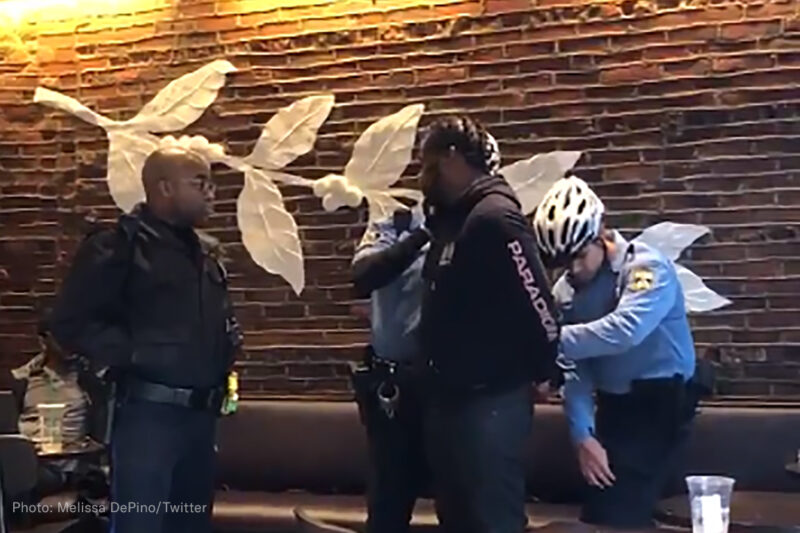
Late last week, two Black men in Philadelphia were doing what people do every day in this city — they waited in a coffee shop to meet an associate. While they were engaged in this mundane activity, they were removed from the Starbucks cafe at 18th and Spruce Streets in handcuffs by Philadelphia police officers.
This is another example of the kind of daily indignities that African-Americans face every day in Philadelphia and around the country. We can’t even wait in a coffee shop for a friend without the possibility that someone will call the police. Two days after the news broke of the incident, I’m angrier now than I was when I first heard about it.
The neighborhood where this incident occurred is known as Rittenhouse Square. For those not familiar with Philadelphia, it’s a tony neighborhood of beautiful townhouses and high-end apartment buildings.
It’s also the neighborhood with the highest rates of racial disparities in stops and frisks by police in all of Philadelphia. In 2010, the ACLU of Pennsylvania sued the city because the Philadelphia Police Department’s use of stop-and-frisk was discriminatory. Our data that African-Americans were far more likely to be stopped and frisked than their white counterparts. Making matters worse, those stops were often without any justifiable cause.
A year later, the city agreed to a consent decree to settle the case. That agreement requires the city to collect data on the PPD’s use of stop-and-frisk — including the demographic information of people who are stopped and the reasons why they were stopped — as well as to train officers to eliminate bias-based policing.
The police service area where the Starbucks is located has a Black population of just 3 percent. But 67 percent of the stops that occurred there in the first half of 2017 were of African-Americans. The two other police service areas in this district — known as District 9 — show similar lopsided disparities. In one of the bordering police service areas, a whopping 84 percent of pedestrians stopped were African-Americans in a neighborhood with a Black population of 16 percent.
Seven years after the city agreed to do better, we still see consistent racial disparities in stops and frisks. Yet, in a video statement in response to the incident, Philadelphia Police Commissioner Richard Ross had the nerve to say that his officers “did absolutely nothing wrong.”
His statement, the data the city has collected on stops, and this incident all lead me to wonder if Ross and his department leaders in this district and this police service area, Capt. Danielle Vales and Lt. Jeffrey Rabinovitch, are serious about ending racial profiling in this neighborhood and throughout the city.
There was no need for a Starbucks employee to call 911 because two men were waiting for an associate in their store. And even after the police were called, the police did not have to end the situation by arresting these men. If Commissioner Ross is right that these officers followed policy, then the policy needs to change. Starbucks may be able to decide who sits in its store, but only the police could decide to arrest these men.
Racial bias and discrimination are so steeped in American culture that those of us who experience it on a regular basis have learned to live as second-class citizens in the country of our birth. Many folks have expressed pride or relief because the two men remained calm. I get that. I am glad, too. We have seen far too many incidents that have quickly spiraled out of control.
But there is an ugly side to that as well. Black people, men in particular, are not allowed the full range of emotional expression in public spaces. Even when an emotion other than being calm is warranted, we have been taught and have learned to police our emotions. No matter how badly we are being treated or how much our dignity is being assailed, we have to be the ones maintaining control and being responsible for de-escalating these situations.
We are not allowed to be angry. Or loud. Or boisterous. Or too happy or too celebratory. In other words, we’re not allowed to be human. We police ourselves because we know that others are already policing us. That, too, takes a toll.
As this story has gathered attention over the last three days, many people are doing backflips to justify what happened here. It is well past time to quit making excuses for racist behavior. Enough with the rationalizations and alternative theories. Believe us. We are credible messengers of our own truths and lived experiences. We shouldn’t have to rely on a white person or a video to validate us.


